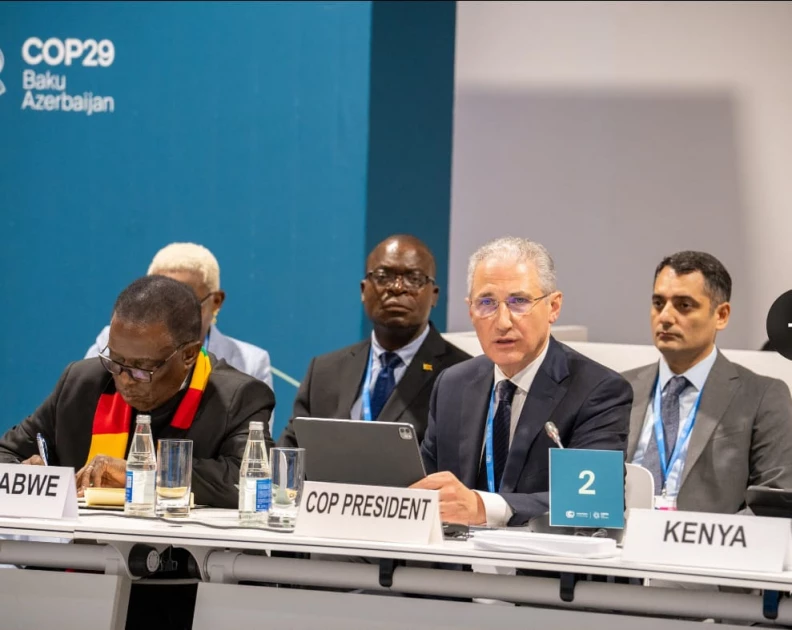COP29 in Baku: Kenya strives to match developed nations in Green Energy revolution

PHOTO| COP29 Azerbaijan X

Audio By Vocalize
While there has been ongoing debate about the origins of solar panel technology, it has undeniably found an established role in the global clean energy economy.
At the 29th Conference of the Parties (COP29) to the UN Framework Convention on Climate Change, delegates, particularly from developed countries, have intensified their calls for a global green energy revolution by 2030.
The tension between the priorities of the Global North and the Global South is not a new phenomenon at climate change conferences. Historically, industrialized, wealthier nations have focused on mitigation efforts to reduce carbon emissions, while countries in the Global South have concentrated on adapting to climate change, as they are the most vulnerable and often bear the brunt of the climate crisis.
Unfortunately, this has often meant relying on financial pledges from wealthier nations—funds that are sometimes perceived as charity rather than a fair climate solution.
However, Kenya has managed to navigate these controversies by seizing every available opportunity to become more reliant on green energy. Despite being a developing nation, Kenya has managed to position itself alongside many developed countries in the race to invest in renewable energy.
Kenya is now part of the International Energy Agency (IEA) association, a group of 13 countries that includes a majority of developed nations. This reflects Kenya's commitment to advancing its energy transition.
The IEA examines a wide range of energy issues, including oil, gas, coal supply and demand, renewable energy technologies, electricity markets, energy efficiency, and access to energy. Through its work, the IEA advocates for policies that promote the reliability, affordability, and sustainability of energy across its 31 member countries—98% of which are developed nations—and its 13 association countries, most of which are also developed.
Governments, private sector representatives, business leaders, and civil society groups have gathered for the two-week-long COP29 conference in Baku, Azerbaijan. Their goal is to find solutions to ensure that global warming does not exceed 1.5°C—a threshold that, if breached, would have catastrophic effects on the planet.
At COP29, the global push for a green energy revolution has taken centre stage, with world leaders, particularly from the Global North, rallying for a universal shift to renewable energy as a means of mitigating climate change.
Dr Sultan Ahmed Al-Jaber, the outgoing COP29 president, addressed delegates at the plenary session early in the week. He shared the exciting news that 2024 is set to break records for renewable energy growth, with over 500 gigawatts of new capacity added, representing a 50% increase over 2023.
Dr Al-Jaber emphasized that 55 companies have already joined the Oil and Gas Decarbonization Charter, committing to achieving zero methane emissions by 2030 and net-zero emissions by or before 2050.
“This initiative is pragmatic, practical, and focused on real results. Participants from China, India, Russia, the US, the EU, and the Arabian Gulf are involved. It is the most meaningful and comprehensive private sector partnership on decarbonization to date. We look forward to more companies joining this vital initiative in the spirit of proactive collaboration,” he said.
Mr. Simon Stiell, Executive Secretary of the United Nations Framework Convention on Climate Change (UNFCCC), also addressed the delegates, asserting that the shift to clean energy and climate resilience is unstoppable.
“Our job is to accelerate this shift and ensure that its huge benefits are shared by all countries and peoples,” Stiell said.
UN Secretary-General António Guterres also added his voice to the growing chorus advocating for the green energy transition.
“For the first time, investments in renewables have overtaken those in fossil fuels. The green revolution is here! No group, no business, and no government can stop it,” Guterres declared.
Experts at the COP29 conference have projected that global clean energy and infrastructure investments will reach $2 trillion by the end of 2024—nearly double the amount spent on fossil fuels.
Mr. Stiell, in his address to the delegates, also highlighted the urgency of action, calling on every country to submit their third generation of Nationally Determined Contributions (NDCs) by the end of 2024. These updated plans should reflect a serious commitment to tackling climate change as a global team.
“We need to advance mitigation efforts so that the targets set at COP28 in Dubai are achieved. We cannot let the 1.5°C target slip out of reach. Even as temperatures rise, we must work to implement our agreements and bring them back into balance,” Stiell emphasized.
The global call for a green energy revolution comes at a time when Kenya is stepping up its efforts to catch up with developed countries in ensuring 100% green energy by 2030. On the sidelines of COP29, Kenya hosted the Powerelec Kenya 2024 conference—a 3-day African Solar Energy Conference focused on renewable energy storage and electrical industries. The event attracted regional and international stakeholders from the energy sector.
Kenya’s commitment to green energy is evident in its progress toward powering its national grid entirely with renewable energy by 2030. Currently, 90% of the country’s energy is sourced from renewables, with 45% from geothermal, 19% from hydropower, 17% from solar, and 3% from wind. The country’s energy mix serves as a model for integrating variable renewables and enhancing grid flexibility.
Kenya’s progress is further reflected in its 100% electricity access rate in urban areas and 65% in rural areas. The country’s total energy generation capacity stands at 2,150 MW, with projections for continued growth through public-private partnerships focused on renewable energy.


Leave a Comment